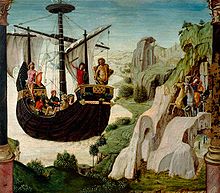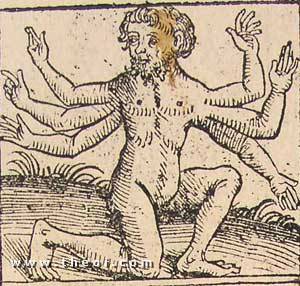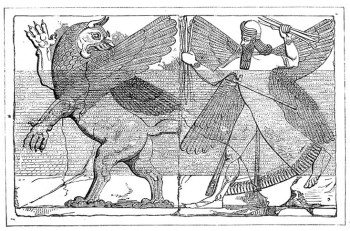Ancient Worlds: Shots in the Dark
 Previously on Ancient Worlds: We’ve been discussing Apollonius of Rhodes’ Argonautica, which tells the story of Jason and the Argonauts, well known from many a late night creature feature.
Previously on Ancient Worlds: We’ve been discussing Apollonius of Rhodes’ Argonautica, which tells the story of Jason and the Argonauts, well known from many a late night creature feature.
After Heracles convinces his fellow Argonauts that the encircling Lemnian peril is too perilous, they sail on and the Argo makes its way through the Hellespont. There they find an island populated by “Earth-born monsters” with six arms each.
This is a recurring theme in Greek myth. Not just monsters, of course, although the Greeks love a good monster. (AND WHO DOESN’T?) The most terrifying and most anthropomorphic tend to be Earth-born, that is, creatures that spring up out of the earth.

There are the six-handed Gegenes Apollonius describes, the original one-eyed Cyclopes, the Hundred-Handed monsters who forged Zeus’s thunderbolts… all of these are born from Gaia without a father. These creatures are almost always hostile to humans and to the Olympian gods, although precisely what that means is up to debate.
Some people argue (with incredibly scanty evidence, I would add, but I have a real axe to grind here) that this is evidence of a pre-Bronze Age cult of Mother Earth that was suppressed with the coming of Eastern invaders bringing sky-gods like Zeus with them.
Other people suggest that this is merely a part of the dynastic nature of Greek myth. We see the same trends in Middle Eastern myth, as we’ll see when we get to Mesopotamian myth somewhere down the road. Gaia is paralleled there by Tiamat, who both births and tries to destroy creation.
I think the most basic answer is that life in the Mediterranean was more harsh than we can easily imagine in the modern world. Rainy periods were very brief; the heat was intense; and storms, tsunamis, earthquakes, and hurricanes were frequent and immensely destructive. If you are going to personify the Earth in any way, it is not going to be as a nourishing, loving mother and if we are shocked by the way the Greeks saw their deities, it was because they were realists.

The next-door neighbors of the Gegenes were the Doliones, who were ordinary humans. Quite nice humans, in fact: they welcome the Argonauts with open arms and their young king, Cyzicus, fetes them along with his new bride, Cleite. They’re a blissfully happy couple: young, pretty, and in love.
And if you love Joss Whedon, you know what must happen next.
The Argonauts set sail at nightfall. But unbeknownst to them, the winds change in the night and when they make land again, it is back on the land of the Doliones. But in the darkness, no one knows this. The Doliones, living under constant threat of attack by the six-armed giants, attack the invaders. The Argonauts, thinking they’ve encountered a hostile tribe, respond in kind.
It isn’t until the next morning that they discover they have killed Cyzicus. His shocked wife hangs herself and the entire population is thrown into grief. The Argonauts share in that grief and throw the king and queen a magnificent funeral.
It’s all fabulously trope-tastic and here is where, gentle readers, I ask a favor of you. I feel like I have seen this trope over and over again: our hero fights and kills someone he thinks is an enemy, only to discover, too late, that it is a friend. But I’m having a difficult time coming up with examples without cheating and using TVtropes. Other than Hamlet and Polonius, where else does this appear?
Next up: So about Heracles and that bow that is so big he needs someone to carry it around for him…
Though death isn’t involved, superheroes usually get into these situations.
I want to say that the Hundred Handed Ones are the children of Gaia and Ouranos. The Giants, I think, are children of Gaia and Tartaros. (Or maybe that’s Typhon).
Good series, by the way.
An example from more recent myth making: in the Silmarillion Túrin kills his friend Beleg Strongbow. And of course Hercules killed his children, believing – thanks to the ever sympathetic Hera inducing a fit of madness – that they were enemies.